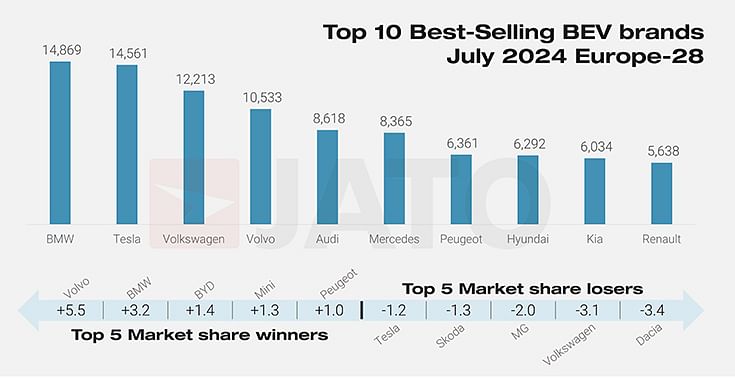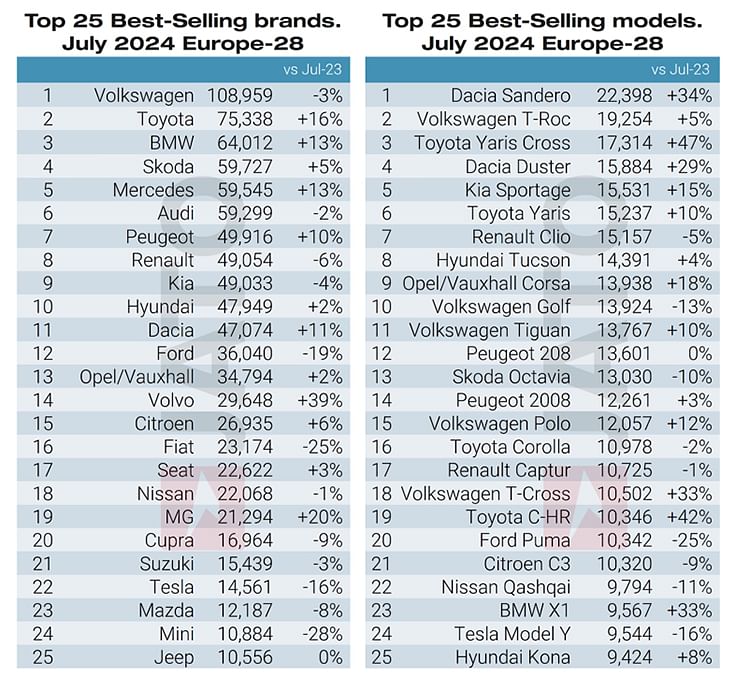BEV sales in Europe take the slow lane in July, BMW tops for the first time
The lack of clarity around the incentives for EVs impacts sales; July 2024’s 139,300 BEV sales are down 6% YoY. BMW led the EV brand ranking with a 35% YoY increase, 308 units ahead of Tesla, which recorded a 16% YoY decline. Sales of BMW’s electric models outpacing Mercedes and Audi.
Demand for cars in Europe increased marginally by 2% last month compared to July 2023. JATO Dynamics’ data for 28 European markets revealed that a total of 1.03 million units were sold in the region, taking the number of year-to-date new car registrations to almost 7.9 million units.
Growth was particularly prominent in Poland (+19%), Portugal (+27%), and Slovakia (+12%). There were also slight increases in the UK (+3%), Italy (+5%), and Spain (+5%). In contrast, vehicle registrations decreased in Germany (-2%), France (-2%), Belgium (-7%), the Netherlands (4%), and Ireland (-5%).

SUVs account for 54% of new vehicle sales
For the last decade, SUVs have been increasing in popularity in Europe. In July 2024, they accounted for 54% of all vehicle registrations – a new record for the segment. Last month, 554,000 new SUVs were registered, a rise of 6% from July 2023. As a result, the year-to-date volume of SUVs reached 4.2 million units, an increase of 5%. While Toyota, BMW, Mercedes and Geely Group drove growth in the SUV segment, the Volkswagen Group took poll position, leading the market by volume.
Twenty-six percent of SUVs registered were Volkswagen Group vehicles, followed by Hyundai-Kia with 12% and Stellantis with 11.5%. C-SUVs (compact models) saw the most demand, registering 210,600 units – a rise of 3%. Growth in the segment was also driven by B-SUVs (small models) with a volume increase of 14% - registering 204,300 units. E-SUVs (large models) registered 27,600 units, and F-SUVs (luxury models) registered 5,022 units, up by 23% and 32% respectively. The demand of D-SUVs (midsize SUVs) fell by 7% in July, recording 106,500 units.
According to Felipe Munoz, Global Analyst at JATO Dynamics, “Consumers in Europe now have access to more choice than ever before, and SUVs are a more comfortable and desirable option for many. This alongside the increasing availability of affordable models is helping consumers to make the switch from traditional segments to SUVs.”
 BMW led the EV brand ranking last month, with a 35% year-on-year increase.
BMW led the EV brand ranking last month, with a 35% year-on-year increase.
EV sales down 6% YoY to 139,300 units
The demand for electric vehicles fell in July, with their market share decreasing from 14.6% in July 2023 to 13.5% last month. According to JATO’s data, 139,300 new electric cars were registered last month, down 6% from July 2023. Munoz said: “The lack of clarity around the incentives for - and future of – EVs continues to present a barrier to consumers considering an EV. These factors, alongside the low residual value of EVs contributed to the decline seen in July.”
BMW led the EV brand ranking last month, with a 35% year-on-year increase. This was a strong performance compared to Tesla, which recorded a 16% year-on-year decline. While the Tesla Model Y and 3 both continue to dominate the year-to date BEV ranking, they have recently lost ground. The Model Y is no longer Europe’s best-selling vehicle and landed in ninth position in July’s overall vehicle ranking.
BMW’s latest models – including the iX1, i4, and i5 – performed well in July, while the new iX2 registered more than 1,300 units. Sales of BMW’s electric models are clearly outpacing those of its Mercedes and Audi counterparts.
Strong demand for Dacia Sandero
The Dacia Sandero was the region’s most sought-after car in July, registering 22,400 units – an increase of 34%. This is over 3,000 units more than the second best-selling car, the Volkswagen T-Roc (introduced in 2017). The 10 best performing cars in July comprised five SUVs and five hatchbacks. The Volkswagen T-Cross, Toyota C-HR, BMW X1, Peugeot 3008, Skoda Kamiq, Skoda Fabia, Seat Ibiza, Kia Niro, Jeep Avenger, and Mercedes GLC also did well in July.
On the other end of the spectrum, those that experienced decline included the Ford Puma; Tesla Model Y; Fiat Panda; Audi A3; Fiat/Abarth 500; Mini Hatch; Opel/Vauxhall Mokka; Kia Picanto, Volkswagen ID.4; Mercedes C-Class; and Skoda Enyaq. Europe’s second-most popular EV of the month was the Volvo EX30, with almost 6,600 registrations. MG registered over 4,000 units of the MG3; Fiat registered 2,636 units of the 600; BMW registered 2,302 units of the i5; Renault registered 2,235 units of its new Scenic model; and Lexus registered 2,186 units of the LBX.

RELATED ARTICLES
Autoliv Plans JV for Advanced Safety Electronics With China’s HSAE
The new joint venture, which is to be located strategically near Shanghai and close to several existing Autoliv sites in...
JLR to Restart Production Over a Month After September Hacking
Manufacturing operations at the Tata Group-owned British luxury car and SUV manufacturer were shut down following a cybe...
BYD UK Sales Jump 880% in September to 11,271 units
Sales record sets the UK apart as the largest international market for BYD outside of China for the first time. The Seal...






 By Autocar Professional Bureau
By Autocar Professional Bureau
 24 Aug 2024
24 Aug 2024
 7580 Views
7580 Views





 Ajit Dalvi
Ajit Dalvi




